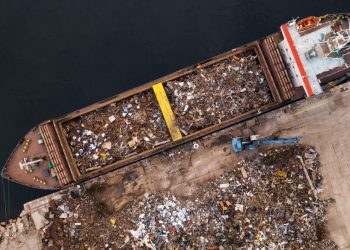During the 2022 GREEN4SEA Forum, Henning Gramann, CEO, Green Ship Recycling Services, talked about sustainable ship recycling, providing an overview of the strategies for identification, selection and control of recycling yards.
No matter how nice and shiny anything is today, it is a matter of time to become waste. When that day comes the question is what can be done for ensuring a proper recycling. Each and every company should think about their own corporate social responsibilities and other ESG compliances on what needs to be done with the old assets.
The common process consists of four major steps:
- Compliance Concept: Identification of legal, organizational and technical requirements.
- Planning of Recycling: Identification of Hazardous Materials & specific requirements, Selecting recycling yard (vetting), Contracting.
- Last Voyage: Schedule, Ex-Im-Clearance, Delivery Arrangements, and other activities
- Ship Recycling & Supervision: Supervision of ship recycling process, waste disposals, reporting.
Compliance Concept
This is already a big obstacle and quite challenging for many. This is because we have various legislations, international conventions, amendments, and regulations and it’s not so easy to really figure out what applies to a certain ship, because quite a few of these conventions are directly connected to the position of the ship when the decision for recycling is taken.
Each and every destination has its own legal regimes and requirements or a combination thereof and they need to be investigated carefully and of course we need to ensure legally compliant processing.
Planning of Recycling
Based on the previous, a strategy needs to be developed, while different initiatives and requirements within the maritime industry all need to be reviewed, in order to have a really solid and sound recycling strategy.
In addition, operators need to know what is to be recycled, what the ship type is, as well as the size of the hazardous materials on board, in addition to what capabilities are required from the ship recycler to handle the operation in a safe and environmentally sound manner.
Knowing all these can be used and should be used on knowing what the recycler needs to provide. However, these different capabilities need to be bettered in case there are a number of different recyclers, as the operators must evaluate whether or not the capabilities are as described.
With these weighing factors we come down to certain numbers, according to the results of the vetting inspections, and that makes it quite obvious which recycler really offers the best solution.
When we do that, we always take care that mandatory and very important aspects can’t be overruled by less important aspects and this needs to be reflected in the numbers or the scores and the weighing factors as well
Next, all the different requirements which have been developed in the first stage and which have been adopted to the ship specific conditions, need to be reflected in the contract. We usually work with a RECYCLECON developed and provided by BIMCO, which is a very good basis, but it needs to get more meat on the bone.
Today we always include a performance bond and related milestones, which when they are met, part of the performance bond will be paid to the ship recycler. In most cases as soon as the ship is delivered to the recycling facility there is no option to get the ship back, and if the recycler is not performing, the seller or the previous owner cannot do much.
This is really tricky and for that we have the performance, but the milestones need to be defined extremely well and clear so that no further disputes are arising from those aspects
Regarding supervision, we always suggest to look for third-party independent supervision. If the supervisors are coming from the sellers they might have different interests than the supervisors coming from the buyer side, or from the recycler side, or an intermediate side, like cash buyers.
So, the supervisor always has to be independent, but they should not only act as a policeman, they should also act as an advisor, because it’s our all common goal to ensure safe and environmentally sound recycling. If the supervisor sees any risk appearing or coming up they should raise awareness amongst all interested parties.
Ship Recycling & Supervision
When we look into the supervision of the recycling process, shipping must deal with a huge number of completely different aspects, which has to cover during the daily operations and supervisions, and this needs to be reflected in the report.
The findings and observations need to have a proper follow-up not only in regards to quality documentation but also on what we see in the field, such as prevention of falling from height, hot work conditions, labeling, first aid stations, and anything which is related to emergency preparedness.
Once the job is done we need to document where all the waste have gone, how much waste was generated and what were the valuable materials. Without that we can’t really show where all the materials have gone to, but the transparency in this process is extremely important.
Conclusions
- Legal and individual aspects create a set of requirements
- Due-diligence inspections required for on-site evaluation
- Benchmarking of potential recyclers required
- Ensure that financials can´t overrule crucial performance aspects
- Include conditions in contract
- Create transparent process
- Supervision essential
The views presented are only those of the author and do not necessarily reflect those of SAFETY4SEA and are for information sharing and discussion purposes only.






























































